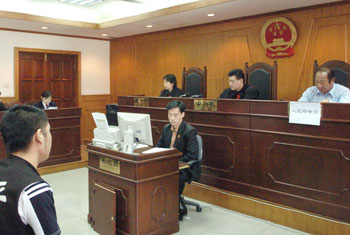| Tools: Save | Print | E-mail | Most Read |
| China Questions and Answers |
| Adjust font size: |
Q: It is reported that China is reforming its judicial system. What are the key points of the reform? How will the state protect the legitimate rights and interests of its citizens, and advance justice? A: As we all know, reform of the judicial system is a very important part of reform of the political system. Among all the reforms, it is the most dynamic one over the past decade. At present, when there are disputes between common people and government agencies, they can bring their cases to court. The involved parties do not need to worry about justice. This indicates great changes in China's political life. In the past, neutrality was often ignored in China's judicial system. Since the reform and opening up in 1978, great changes have taken place in politics, the economy and society, which raised new requirements for justice. The understanding of justice with respect to the government, society and people is also changing. Presently, ideas of justice, independent trials, judicial efficiency, judicial democracy, procedural justice, professional judges and so on are commonly accepted in China, serving as the basis for the country's judicial reform. China is now in a transitional period that must lead to the establishment of a country ruled by law. Under the rule of law, the justice system and courts must perform more important functions. Over the past decade, China's judicial reform has developed very rapidly in terms of both the scale and specific reform schemes. During this period, the Chinese judicial department has further reformed and improved the management mechanism of judges, procedures and evidence system, advanced trial procedure reform, established and perfected civil, criminal and administrative trial systems and the judicial aid system, and regulated systems of appeal and retrial. At the same time, the judicial department has also improved the system of judicial openness, and the advanced civil trial system reform with an emphasis on public hearings, according to which all civil cases in court shall be heard in public except for those otherwise stipulated by law, allowing visitors, media reports and even live reports, so that trials are more transparent and fair, and justice is promoted. On May 1, 2005, the Decision on Improving the People's Juror System, adopted by the Standing Committee of the 10th National People's Congress, took effect. People's jurors are chosen in accordance with the law and participate in trials with the same functions as judges. This system not only reflects judicial democracy and is beneficial to people's supervision of justice, but also helps to protect the legitimate rights and interests of citizens. China's judicial reform fully considers the country's economic and social development level, cultural traditions as well as major problems needed to solve and present situation of quality of judges. China will further advance reform of the judicial system with the aim of realizing justice and fairness in the whole of society. The state will, in accordance with the requirements of impartial justice and strict enforcement of law, perfect structures, functions and management mechanisms of judicial departments and further develop a judicial system with clearly defined power and responsibilities, mutual coordination, and high efficiency.
|
| Tools: Save | Print | E-mail | Most Read |
 |
| Related Stories |
|
Product Directory China Search |
Country Search Hot Buys |
